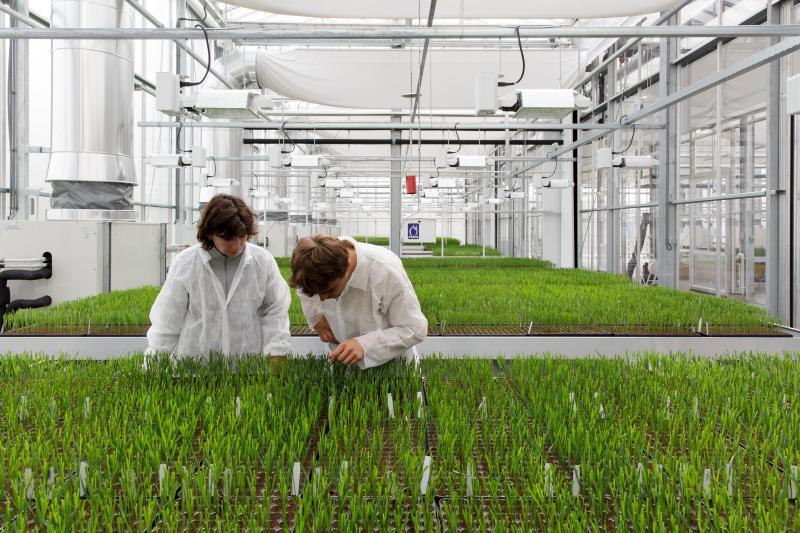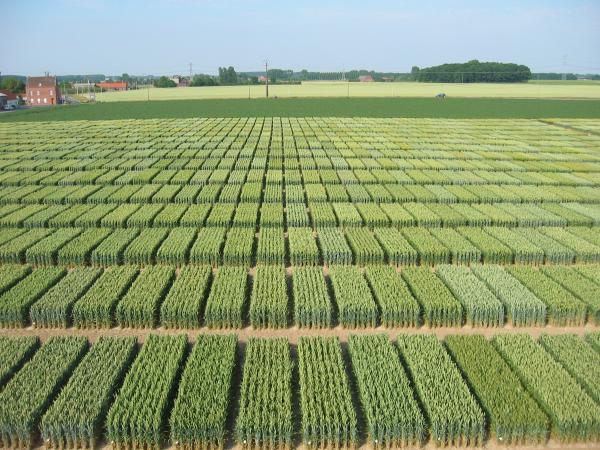A French firm is breeding plants that resist climate change and need less pesticide and fertilizer
An EU ban on neonicotinoides, an insecticide used to protect plants like sugar beets from diseases spread by aphids, seemed like a good idea in 2018. The insecticide was found to harm bee populations, and the European Union had decided to prohibit neonicotinoids as part of a larger push for more sustainable agriculture.
But the ban led to ravages of jaundice in some sugar beet fields, cutting harvests in one of the world’s biggest producers of sugar from beets and threatening the industry. As a result, France rolled back the ban until 2023.
That’s not much time. Developing new plant varieties usually takes seven to ten years. The Florimond Desprez Group, a plant breeder and seed producer in northern France, is working hard on the problem. The company has been breeding sugar beets for almost 200 years, and it is tapping its deep experience to develop a plant that can resist jaundice, while still maintaining its natural resistance to other scourges, such as the rhizomania virus.
It’s a race that has implications for other plants and areas of agriculture.
“For agriculture to be more sustainable, we need to use less nitrogen fertilizer, which has a significant carbon footprint, and less pesticides,” says Marin Desprez, group strategy director at the Florimond Desprez Group. “If a plant variety is naturally resistant or tolerant to a disease, you don’t need chemicals to protect it.”
Agriculture is under pressure because of climate change, the need to reduce its environmental footprint and a growing world population to feed. The research and development of agricultural firms like Florimond Desprez, a relatively small company in an industry dominated by giants, is crucial for breeding plants that require less resources or chemical treatments, but that still produce enough food in increasingly difficult conditions. According to one study, without plant breeding Europe would have produced 20% less arable crops in the last 20 years, and agriculture would have consumed an additional 21.6 million hectares of land and spewed 4 billion tonnes more carbon.
The European Investment Bank is supporting Florimond Desprez’s research and development, primarily in France and Belgium, with a €40 million loan signed in April. The loan is backed by a guarantee from the European Fund for Strategic Investments, now part of the InvestEU Fund.
“The sector needs a lot of investment, and funding is not easily available, particularly when you are not a large company,” says Zeina Chebli, the European Investment Bank loan officer on the project. “Large companies have easy access to capital markets – but smaller companies need our support.”
Breeding plants for centuries
Florimond Desprez is a quintessential family business. The Desprez family founded the enterprise in 1830 – five generations ago – in Cappelle-en-Pévèle, a village just south of Lille. The business benefitted from a burgeoning sugar beet industry created with Napoleon Bonaparte’s support. During the Napoleonic wars, Britain blockaded France’s trade with the Caribbean, virtually cutting off imports of cane sugar.
“They have been part of the sugar beet industry since the origin several generations ago. So the history is quite nice,” says Sébastien Collot, a senior engineer in the European Investment Bank’s bioeconomy team. “Through the loan, we help them remain competitive and address key environmental challenges of the agriculture sector – such as adaptation to climate change – while supporting rural areas, notably in northern France.”
Over the years, the firm has diversified into crops such as industrial chicory, potatoes and wheat. From the beginning, the firm bred plants and then sold the seeds from its new plant varieties. The idea is relatively simple. A variety of wheat, for example, that makes particularly tasty or crunchy bread, will be crossed with another variety that is particularly hearty or resistant to disease. Researchers will pollenate one variety with the other by hand, creating a hybrid. The numerous offspring of that hybrid will then be planted and observed, to ensure that the desired characteristics – tasty bread and disease resistance – can be found in the new plant.
In the case of sugar beets, however, the drive to develop plant varieties resistant to jaundice stopped when neonicotinoids came onto the market in the 1990s. “Growers told us, ‘I don’t need a variety that is resistant or tolerant because I have this product, so we focused on other diseases,’ ” Desprez said.
Now, Florimond Desprez is scouring the bank of plant genes it maintains to find varieties of beets – wild ones as well as plants from 20 years ago – that displayed a resistance to the virus. The firm will then breed them with new beet varieties with a tolerance for modern-day diseases. Crops grown from this new hybrid will also have to yield enough sugar beets for producers to remain profitable.
“That is the crux of the issue,” Desprez says.

Agriculture under pressure
For the last 50 years, agriculture managed to keep up with the explosion in the world population. But innovation will have to ramp up if agriculture is to meet future food demand. “We have a combination of factors, with less land available on Earth, more people and increasingly adverse climate conditions,” says the European Investment Bank’s Collot. “So research is important.”
Research is also imperative for dealing with pests and pestilence that don’t normally plague Northern Europe. Farmers found stem rust on wheat in the Champagne region of France last year, a disease that for 20 to 30 years only existed in Morocco. Insects that used to die off during winter now live and multiply, thanks in part to climate change.
“The impact is strong in terms of the crop yields,” Desprez says. “They are strong in terms of new diseases and in trauma experienced by farmers, and they put in danger our food security.”
More extreme and frequently harmful weather, such as heat waves last summer, is also changing where farmers can grow certain crops, he says. Wheat varieties developed for Morocco are now being crossed with plants to develop varieties for northern France. Soy beans that used to grow primarily in the south of France are now being cultivated in southern Germany.

“We’ll go walking in Bavaria and see fields of soya, where before there were fields of wheat,” Desprez said.
To test whether new plant varieties are capable of thriving in these complicated conditions, Florimond Desprez will plant different parcels and then fly drones with hyperspectral cameras over them to see how the plants react to different stress, such as heat.
Peering into a crystal ball
Florimond Desprez’s success depends on the firm’s ability to anticipate environmental conditions eight to ten years down the road, at the end of a research cycle. The company spends a hefty 15% of its revenue on research and development.
To gain time, the company simultaneously conducts research in other parts of the world, at centres in Füzesabony, Hungary, and in Balcarce, Argentina. Testing conditions in other parts of the world is important, as 61% of the group’s revenue comes from exports.
Having a centre in the southern hemisphere also enables the company to gain valuable research time. “In France, for example, we can only plant once a year. But we can plant in France and then send the new seeds to Argentina, or the inverse,” Desprez explains. “That enables us to gain two years in the research cycle of wheat.”
With the extreme pressure on agriculture, it’s easy to fear for the future. But Desprez says a renewed focus on innovation and the development of plant varieties presents enormous opportunities. “I am confident that our occupation, which has a real social utility, will support a more sustainable form of agriculture and better food autonomy in Europe,” he says.
“The transition, however, needs to be progressive, because the timing of agriculture requires it.”
